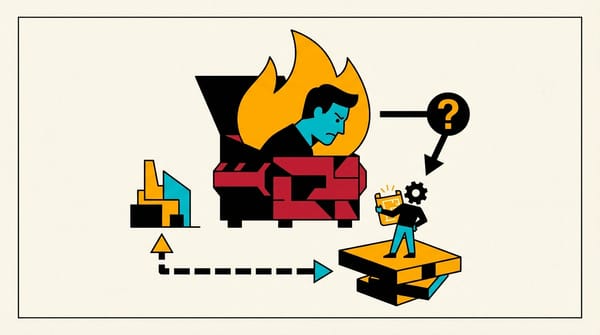I want to lead, not just execute. How do I create a growth plan?
Discover how to shift from execution to leadership. Learn to create a growth plan that positions you for management roles and career success!

🤖 This podcast is generated using AI technology. Disclaimer: The generated content may contain errors.
If your goal for this year is to stop doing exclusively operational work and start managing (possibly in another company or your own), it's important to have a clear perspective on ending the endless routine and beginning more interesting activities.
To start, find out if there are management positions, managerial tasks, or budget for team expansion in your company. If yes, then the situation is more or less clear. Ask how you can help the company and what needs to be done to become a manager. Request specific goals or indicators using the SMART methodology.
If not, do you think this could change? If so, assess how willing you are to stay with this company for some more time. Or perhaps you're ready to start preparing for a leadership position, and see how it goes - whether in your current company or by receiving an offer from a new one.
To put it bluntly, your task is this: create a professional development plan to become an attractive candidate in the job market as a manager. When this happens, you'll be able to offer something worthwhile to your current employer as well.
Most importantly, remember: there's always room for the principle of "fake it till you make it".
"Why is this necessary" and the "five whys" technique
Let's start by analyzing motives. It's important to pause and ask yourself: why do I aspire to become a leader? To earn more? To engage in larger-scale projects? To get rid of routine work? And why get rid of it?
These questions will help you understand your true motives and see alternative career paths. Perhaps to stop doing routine tasks, it's enough to automate processes - without becoming a manager.
In the long term, it's good if your motivation is related to the scale of activities and working with people. Leaders who chase only money or power often burn out quickly. Yes, they have money and power, but with that comes responsibility, overload, the need to work with less competent people, limited freedom, and other aspects of a leader's job. Is it worth it?
If your true motivation is power and money, think: are there other ways to achieve these goals?
Self-discovery is a complex task that takes years for many. If you don't have that much time, use the simple "five whys" technique.
The technique works like this: you formulate a problem, and then ask "why" five times. For example, the situation: I want to start managing. Let's consider a possible train of thought:
- Why do I want to start managing? Because I want to have more influence on the company's results.
- Why is it important to influence the company's results? Because I see how processes can be improved and efficiency increased.
- Why do I want to improve processes? So that the company grows faster and achieves greater success.
- Why is company growth important? To create more opportunities for employee development and implementation of ambitious projects.
- Why are ambitious projects important? Because I want to be part of something significant and leave my mark in the industry.
Thus, starting with a question about management, we concluded that the person seeks to find like-minded individuals and implement significant projects.
However, don't get too carried away with this technique. I've met managers inspired by it but not understanding how to use it. They wore out employees with endless questions, resulting in neither the manager nor the employee understanding what the essence was and what they really wanted.
I've also worked with people for whom this technique acted like a red flag to a bull. The effectiveness of the method depends on your state and readiness for self-analysis. Often it's quite an unpleasant process.
By the way, to drive a luxury car, you don't necessarily have to buy it - you can rent one. To relax in the countryside, you don't have to build a house - you can go to a country hotel. To be financially secure, you don't have to become a manager - you can develop as a specialist.
Understanding the skills needed for leadership
At this stage, you need to determine if you can be a leader; which leadership skills you already possess, and which ones you'll need to develop.
Here's a basic set of leadership skills:
- Team management: hiring, firing, building internal processes, feedback, team training.
- Negotiation and argumentation skills: how to communicate with clients and the team, conduct business correspondence, advocate for ideas.
- Presentation and self-presentation: how you present projects, whether you manage to convey decisions to the team.
- Economics and analytics: finding effective solutions based on financial data, budget optimization.
- Applied knowledge in your field — be it design, development, or another area.
Try to give yourself an initial assessment: which skills are well-developed, and which are not so much. For example, team management and presentations — 7 out of 10, and negotiations — 5 out of 10. Then think: are you interested in developing these skills? Are you ready to improve the abilities you lack? Will this development be forced or enjoyable?
First, subjectively evaluate your skills
Read more here: www.ksnk.media/career-crossroads-specialist-or-manager-what-to-choose-for-a-successful-future/
Start developing missing skills
Skill development is your growth plan. In the previous stage, you essentially broke down the global goal of "managing" into several components. Each component is a specific skill. Now your task is to work on each skill separately.
Let's say you lack project management skills. One way is to take a specialized course in project management. This will provide you with a theoretical foundation and necessary tools.
Remember that developing managerial skills is a gradual process. It's important to start with small steps, gradually increasing the level of responsibility and the scale of tasks.
Another approach is to start applying project management principles in your current work. For example, take on the coordination of a small project in your department, using basic project management principles.
After a certain period of time, compare the new assessments of your skills with the old ones. This will allow you to evaluate your progress and adjust your development plan if necessary.
Even a subjective rating scale is better than none at all
Rely on new experiences
With new responsibilities, it's worth asking yourself: "Do I enjoy being a leader?" After conducting your first meeting, assess your feelings. Were your eyes shining? What did you feel?
Real examples confirm the importance of this reflection. Take the story of Mark Zuckerberg, the founder of Facebook. Starting as a technical specialist, he eventually became CEO. However, this role didn't come easily to him. In a 2017 interview, Zuckerberg admitted: "When we were just starting out, I didn't want to be CEO. I didn't understand what it meant. I just knew I wanted to build." It took him years to get comfortable in the leadership role, and he openly talked about the difficulties of this transition. This example shows that even successful entrepreneurs can become disillusioned when transitioning to a management role if they don't initially understand all its aspects.
For some, it's enough to grow horizontally, developing specialist skills - this is also a career path. Perhaps the role of a mentor will suit you. Or maybe the fire of leadership will ignite in you: a desire to solve problems, develop a team, build processes. The main thing is to try.
Request feedback
It's helpful when someone besides you evaluates your competencies. This can be colleagues, subordinates, or your manager. Show them your development plan and ask: do their assessments match yours? How would they rate you?
It's important to remember that feedback is not always objective. Personal relationships and sympathies can influence evaluations.
How to work with feedback. After receiving a comment, decide whether to take it into account. If the comment seems far from the truth, you can disregard it.
As always, I invite you to share your opinion in the comments
With love 😽 🤗 😘
K




